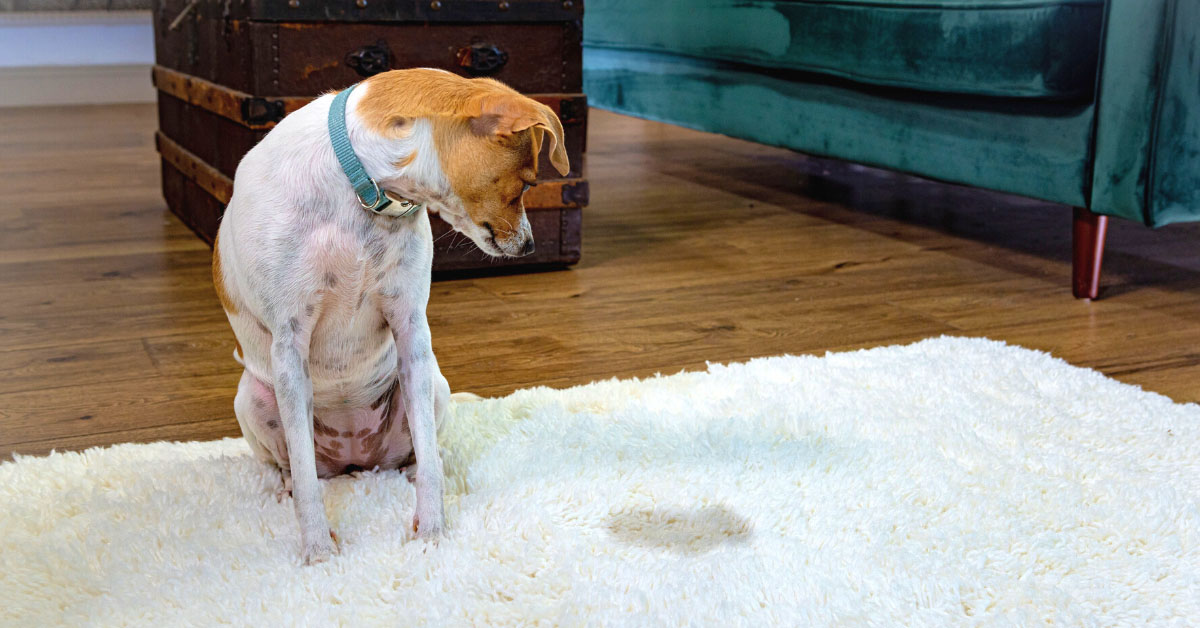
How to Stop Your Dog from Peeing in the House
This post may include affiliate links. Please read my disclosure policy.
Found yourself typing “how to stop dog from peeing in house” on Google? You’re not alone. When your dog’s peeing in the house becomes a habit, it can leave you feeling confused, frustrated, and even desperate. Housebreaking issues have even led some dog parents to surrender their pets.
Get this article read to you by a real human!
Also called “inappropriate urination” by vets, there are plenty of reasons why dogs pee in our homes. If your fully potty-trained dog is peeing in the house more than occasionally, don’t fret! There are steps you can take to help break this habit. Below are some tips on what you can do to guide them back to good potty behaviors.
Why Is My Dog Peeing in the House?
First, to stop your canine companion from peeing indoors, it’s important to identify the underlying cause of the behavior. Below are some potential causes to consider. But talk to your veterinarian before drawing any conclusions.
- Medical Issues: A urinary tract infection is one of the top reasons for inappropriate urination. Diseases like Addison’s, leptospirosis, or even bladder stones could also be the culprit. That’s why visiting your veterinarian first is important so they can rule out any health problems.
- Behavioral Causes: Dogs might pee inside to mark their territory or due to submissive urination, which can be a response to fear or anxiety. Separation anxiety could also cause indoor accidents.
- Insufficient Training or Changes in Routine: Sometimes the issue can stem from insufficient house training or a sudden change in diet or routine that leads to stress or digestive issues.
- Not Enough Potty Breaks: Your pup might simply not be getting outside often enough. Even humans can only hold their pee in for so long!
- Age-Related Incontinence: Older dogs, particularly females who have been spayed, can develop urinary sphincter mechanism incompetence (USMI), which affects their bladder control.
- Fear and Anxiety: Loud noises, new pets, storms, or new visitors can overwhelm some dogs, leading to nervous accidents.
- Stress from Changes: A new baby, a move, or other changes in routine can make your dog feel insecure, resulting in indoor peeing.
Is It Urine Marking or Submissive Urination?
Urine marking is a natural behavior in dogs, where they pee in small amounts on objects primarily to communicate with other dogs. Marking inside the house can be due to a need to make the space feel more familiar, or it may be a sign of stress or anxiety due to changes like new pets or the loss of an owner. Unneutered male dogs are the most frequent markers, but females and neutered males can mark as well.
Submissive urination, on the other hand, is a response to feeling intimidated and is often seen with submissive body language such as avoiding eye contact, lowered ears, or exposing the belly. Some dogs pee because of loud noise or voices, punishment, or even overly enthusiastic greetings, and it’s more common in dogs that have experienced trauma or are genetically predisposed to anxiety. Unlike urine marking, which involves small amounts of urine, submissive urination often results in a larger volume being released.
10 Proven Ways to Stop Your Dog from Peeing in the House
1. Visit Your Veterinarian
If your dog is peeing in the house, you should first talk to your veterinarian. There are a variety of medical conditions that can lead to your dog suddenly peeing in the house, like a urinary tract infection, and treating them is vital for your dog’s health and for solving the peeing problem.
Some issues that cause inappropriate urination may be relatively minor, and some are more serious. Either way, your veterinarian is the best person to diagnose any medical issues causing your dog to pee in the house.
Medical issues that can lead to urinating in the house include:
- Diabetes
- Pain when squatting or lifting the leg to urinate (a possible sign of Canine Osteoarthritis)
- Bladder or urinary tract infection
- Bladder stones
- Kidney or liver disease
- Tumors
- Adrenal gland issues (Cushing’s or Addison’s disease)
- Intestinal parasites
- Cognitive problems caused by brain disease or dementia
- Age-related illnesses and conditions
- Prostate problems
In addition to ruling out medical issues, your veterinarian may also be able to help you determine other reasons for your dog’s urinating. If it’s due to dominance issues or anxiety, a certified veterinary behaviorist can give you tips to help solve the problem.
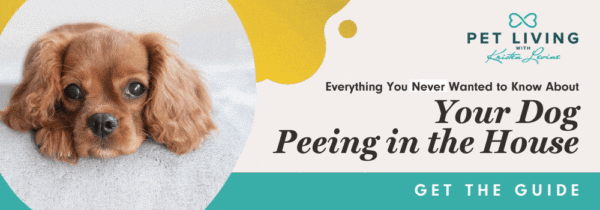
2. Clean Up Accidents Properly
This is listed just below “take your dog to the vet” for a very good reason. Not cleaning up accidents properly is one of the most common reasons why dogs pee indoors continuously.
While house training your pup, accidents are almost always bound to happen. Do you “spray and wipe away”? This could be the reason your dog is continuing to pee indoors!
Even if you don’t notice a smell, your dog may detect lingering odors that invite him to return to the scene of the crime.
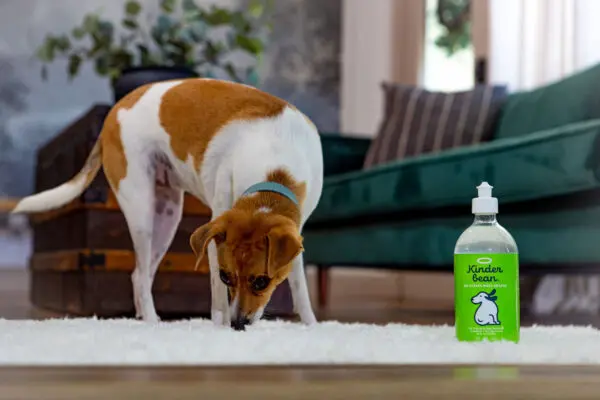
When potty training or house training your dog, a good enzymatic cleaner is the most important thing you’ll need. These cleaners work differently from typical household cleaners, and they must be used properly for them to be effective.
Enzymatic cleaners actually break down the odor so that even your dog’s sensitive nose won’t be able to smell anything. The natural enzymes eat the odor-causing bacteria until they literally disappear. This means the product needs to have sustained contact with the surface and work best by allowing them to dry completely.
My dog Tulip and I love our Kinderbean No Stress Mess Eraser. It’s an enzyme cleaner with a subtle natural scent and is safe for your pets.
If you suspect that your dog pees in areas you haven’t located, a black light can help you find any hidden spots and treat them before your dog develops the habit of going there to do his business.
3. Spay or Neuter Your Dog
Another possible cause of your dog peeing indoors can be behavioral problems. Intact dogs are much more likely to engage in urine-marking behaviors. Spaying or neutering reduces or greatly eliminates the behavior.
If your dog is older, it’s more likely that urine marking has become a habit, and you’ll have to use other techniques to control the behavior.
Pin me!
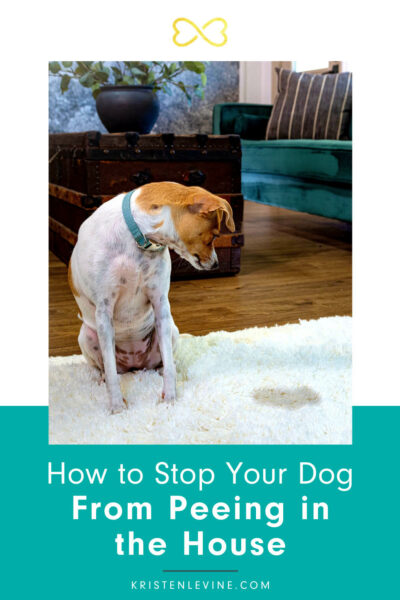
4. Train (or Retrain) Your Dog
In puppies, peeing in the house frequently means that they just need more house training or potty training. If your older dog is peeing in the house, revisiting the training process sometimes solves the issue.
Training a puppy to correct inappropriate urination takes time, patience, and consistency.
Constant supervision helps ensure that you can avoid accidents. If you can’t supervise, try crate training your pup or dedicating a space small enough to prevent him from peeing there. You may want to block off a section of a bathroom or laundry room.
Always make sure it’s large enough that your puppy has space to stand, turn around, and lie down. But use caution, if the crate is too large, it will allow your puppy to pee in one spot and lay in another, defeating the purpose of crate training. And of course, never leave your puppy unattended for hours on end.
Give your puppy potty breaks outside frequently—at least every two hours as well as immediately after waking up, before going to bed, and right after eating. When you take your puppy outside, use a leash and go to the same spot each time. It’s a good idea to use a specific word or phrase while he relieves himself so that eventually he will learn to go on command.
Build their confidence by using positive reinforcement when house or potty training—make sure to praise him a lot and offer a treat immediately after he does his business.
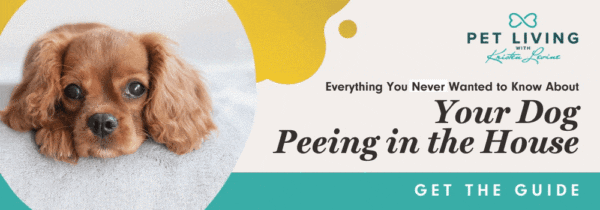
Avoid using puppy pads since they can sometimes lead to confusion and teach him that he is allowed to pee in the house. If you catch your dog peeing in your home, use a loud noise like clapping to let him know that it’s not okay. Don’t yell at him when he has an accident, and never push their face or nose into the mess – he will not understand, and it may lead to hiding instead of alerting when he needs to potty.
Housebreaking an adult dog is a similar process. Many experts recommend a method known as the umbilical cord method. This involves keeping your dog tied to you on a leash so that you can supervise him at all times. After a number of days, you can gradually give him more freedom.
Dogs are creatures of habit and thrive on routine, and this is especially important if you are housebreaking. Keeping his feeding on a predictable schedule will also help to establish a predictable schedule for potty time.
A few tweaks in your dog’s routine can set him up for success if you are trying to break him of the habit of peeing in the house. If your dog consistently has accidents in the same place, you may be able to change the meaning of that location by placing his food and water there. Most dogs will not pee where they eat.
In addition, make sure he’s getting enough physical exercise and mental stimulation.
5. Give Lots of Potty Breaks
Depending on age, breed, size, and other factors, some dogs just can’t hold it as long as others. It’s important to ensure your dog gets the chance to relieve himself as often as he needs.
No matter how well trained, dogs’ bladders have their limits, and going beyond those limits can lead to inappropriate urination. As a general rule, puppies should start by going out every hour. Then you can add one additional hour for every month of age.
Adult dogs should have the chance to go between three and five times per day. Most can hold it for six to eight hours if needed once they’ve been properly trained. Senior dogs may need to go slightly more often—possibly every four to six hours.
6. Identify and Eliminate Anxiety Triggers
If you pay close attention to when and where your dog pees, you may notice a pattern. It may be possible to identify the cause of the peeing and make minor changes in your dog’s routine or environment that make accidents much less likely to happen.
If certain noises or events trigger peeing caused by anxiety, lessen their anxiety by playing music or white noise to mask those sounds – there is even a specific dog channel that ensures music that appeals to dogs. A pheromone collar or diffuser may also help to keep him calm if he has noise phobia, separation anxiety, or other anxiety issues.
Adaptil products are drug-free and mimic the natural hormones that mother dogs emit to make their puppies feel safe and calm. The diffuser covers up to 700 square feet and can be used in the area of the house where your dog tends to tinkle. It’s odorless, so you won’t smell anything, but you may notice a difference in your dog’s anxiety.
The calming collar can be worn all the time except for during bathing or grooming, and it’s great for use when they’re outside or away from home.
These solutions can be particularly helpful when there have been changes in your dog’s environment, such as introducing a new person, when a member of the household moves out, or when moving to a new home.
Some dogs with anxiety also respond well to calming CBD oil or treats.
These tips may also help with a dog who has submissive peeing issues. Dogs that are rescued or come from an abusive background may be more likely to pee out of submission, but this behavior is rooted in anxiety. Keep your dog in a state of calm and consistently reward them for good behavior.
Certain dogs may need to get help from a veterinary behaviorist.
7. Calm the Excitement
In some cases, you might be your dog’s trigger! If your dog gets overly excited to see you or someone they love, excited peeing may happen. This is especially common in small dogs with small bladders.
When you arrive home, speak to your dog in a very calm manner without a high pitch in your voice or wait to greet your dog until they are sitting calmly. Take your dog outside right away.
If you’re having guests, take your dog outside just prior to them arriving and advise them to greet your dog with a calm voice.
8. Introduce New Things Carefully
If your dog tends to “mark” new items that come into the house, avoid leaving things in areas that make them accessible. Introduce new people and objects slowly and with careful supervision. Here’s a blog post that has more information on urine marking.
9. Determine Why Your Dog Won’t Go Outside in Bad Weather
We don’t want to be outside any more than our dogs do! Ideally, we would always watch the forecast and take our dogs out before any bad weather hits. Unfortunately, that’s not always realistic.
For some dogs, peeing outside is simply too scary when the weather is bad. If this is the case, calming collars and pheromones mentioned above may help.
Other dogs simply don’t like getting wet. If this is the case, a jacket like this one may help.
10. Get Professional Help
There are many factors why dogs pee in the house. In addition to consulting with your veterinarian, you may want to arrange a consultation or a few sessions with a veterinary behaviorist who will take the entire situation into consideration and prescribe specific behavior modification techniques with or without medication.
FAQs About Dogs Peeing in the House
1. Will a Dog Belly Band Work?
I never recommend belly bands unless your dog has a medical condition. Even then, it’s best to check with your vet. Belly bands can be very uncomfortable for your dog, and if they’re too tight, they can hurt your dog. A band can also allow urine to sit against the skin and cause urine scalding or ascending urinary tract infections.
If your dog peeing indoors is rooted in behavior, such as anxiety or territorial marking, it’s much better to address the root cause.
2. Do Pee Pads Help Train Your Dog?
Pee pads mean your dog is still peeing in the house. I only recommend pee pads if you’re living in a high-rise or other location where it may not be physically possible to get your dog out in time after he signals he needs to pee.
Even then, a balcony with Doggie Lawn or other artificial turf is best, since they have a designated “outside spot” in which to do their business.
3. My Dog Used to Be Well Trained, but Now He’s Suddenly Peeing in the House. What Happened?
This behavior can sometimes be rooted in anxiety. Have you recently moved? Has a family member recently moved out or moved in? Your dog may be signaling to you that he’s uncomfortable with his new surroundings.
Or he may be facing a medical issue. Anytime your dog’s normal pattern of behavior has changed, it’s important to rule out medical issues.
4. What’s the Quickest Way to Train a Dog to Pee Outside?
We all want a fast-track solution to this problem! Unfortunately, what it requires most is patience and consistency.
That said, I have seen certain methods work very quickly, in just days or weeks. I used the umbilical cord method with my Tulip because I found that during long work periods, I couldn’t watch her as carefully. Keeping her leashed to my desk area helped me understand the cues she was giving me when she needed to go out.
I’ve also seen great success with pet parents using the “eat where you peed” method. One new dog mom was at her wit’s end when her rescued corgi wouldn’t stop peeing everywhere. Once she placed her dog’s food dish next to where she peed, her dog got the hint and within days was trained to only go outside. This may take repetition and consistently placing the food near every pee spot.
5. Why Does My Dog Pee in the Same Spot?
Dogs often pee in the same spot due to their strong sense of smell, which draws them back to places where they’ve marked before. This is habitual behavior, as dogs get used to peeing in a certain spot. This is why placing your pup’s food in places they constantly pee is quite effective, since dogs try to avoid soiling where they eat.
The Tail End
If your dog is peeing in the house, it’s not hopeless! With patience, consistency, and possibly a little trial and error (and lots of treats!), you can treat the issue and enjoy a happy dog and a pee-free home.





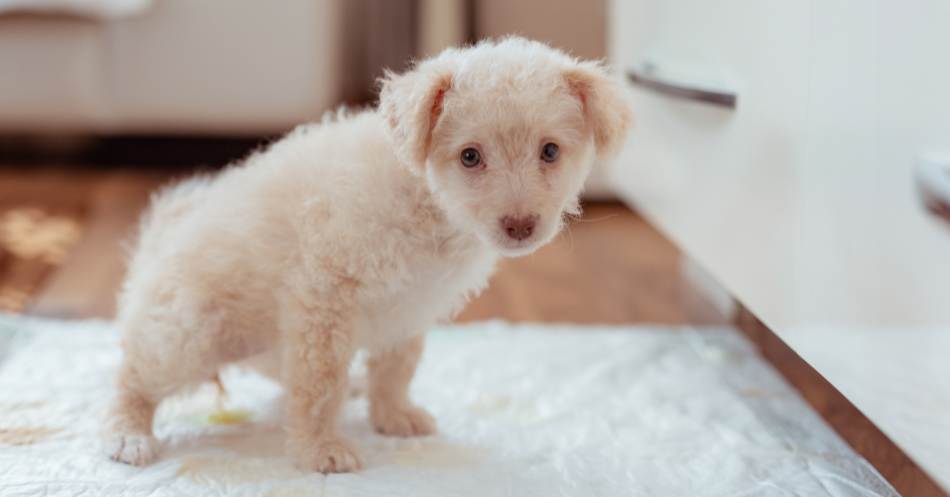
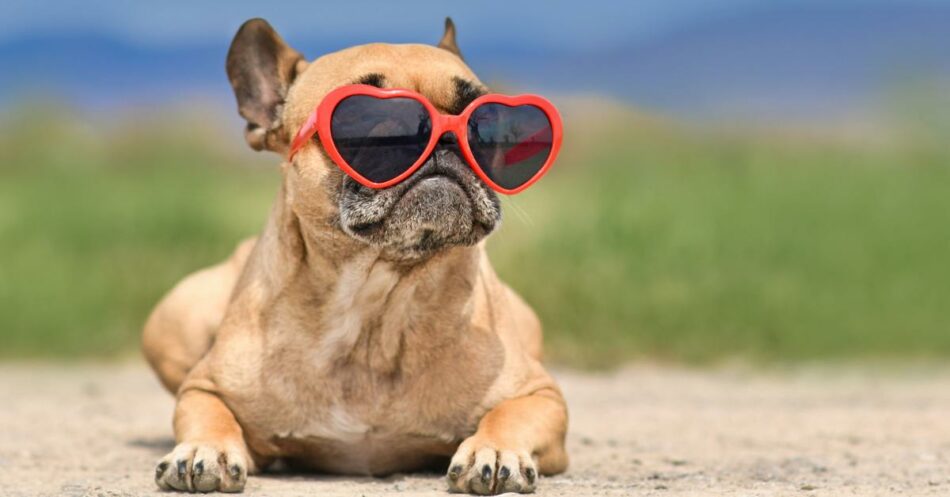
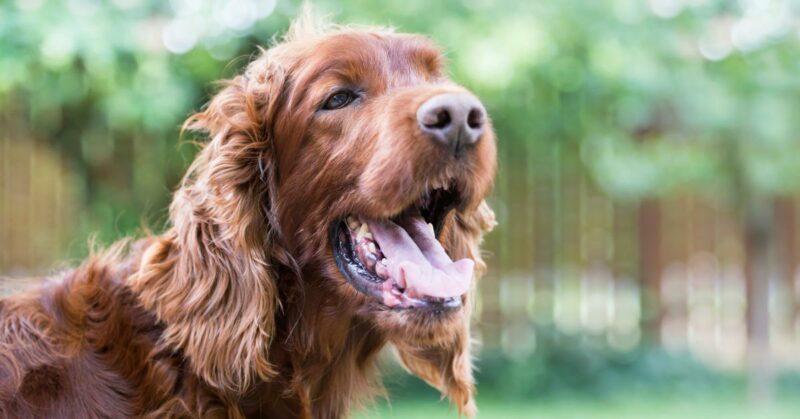
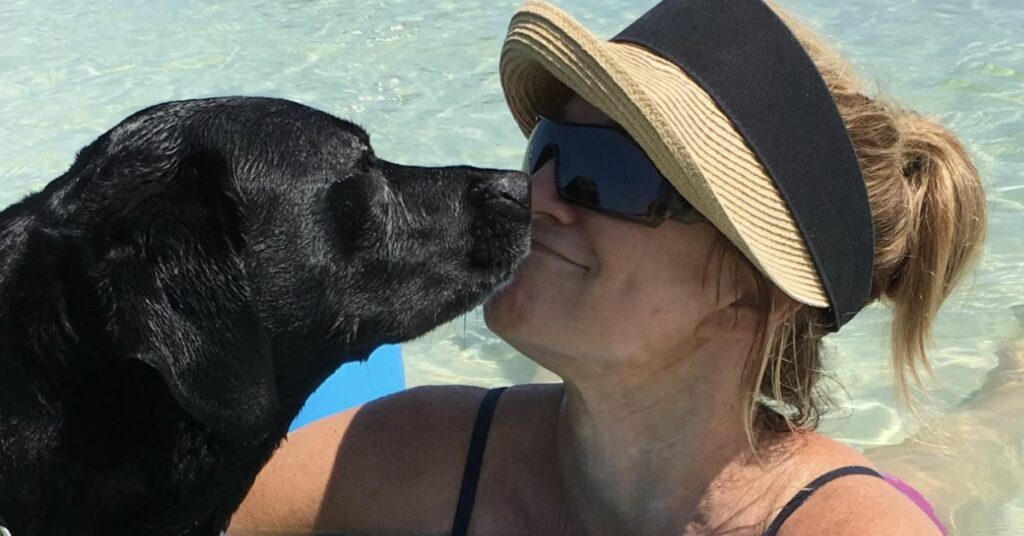
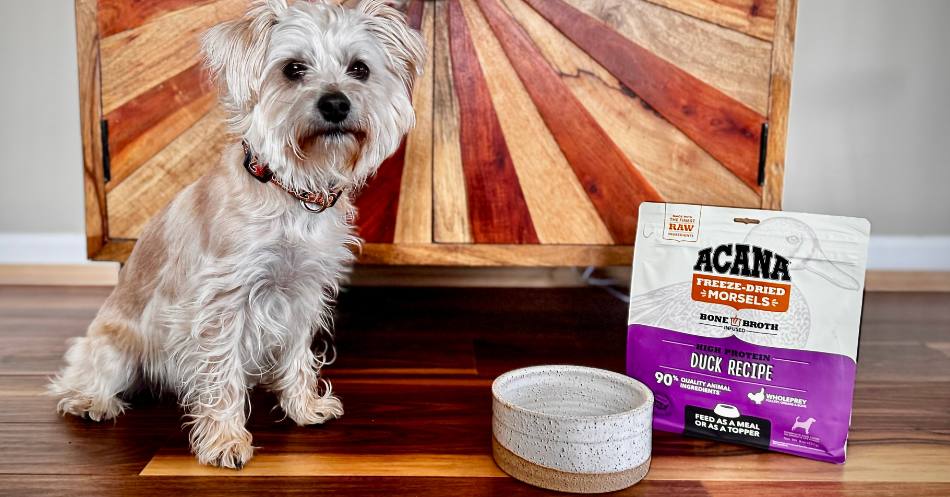
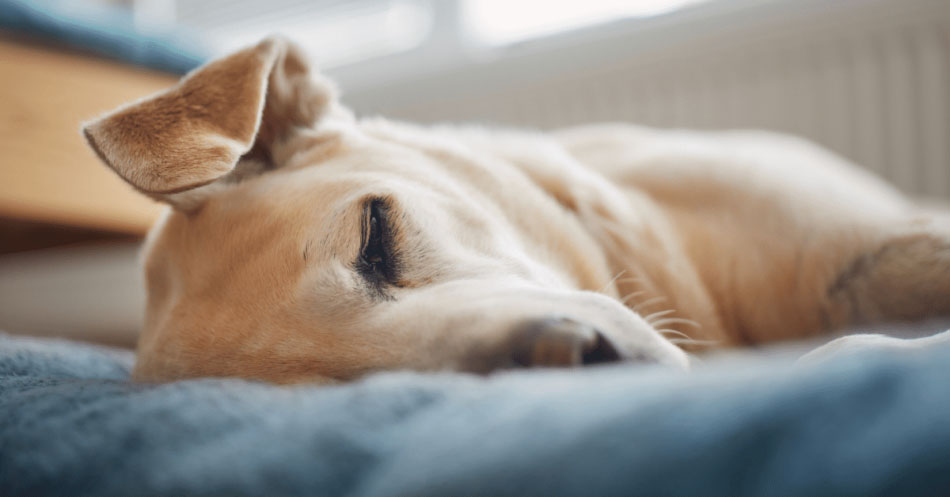
I got a male rescue puppy that the rescue altered at 8 weeks old.. We took him home at 10 weeks home. He is now almost 8 months old & still has piddle accidents in the house ever day.. He can stay in his crate for 8 hours with no problem & when he’s not I take him out every hour; he pees every time.. The way he piddles in the house is a thin meandering trail. I honestly don’t even think he knows that he’s doing it.. I have 3 other dogs & they all were potty trained at 3 months old. I am at my wits end & frustrated that I can’t figure this out.. He is intelligent & wants to please..
Hi Bill,
Did your problem go away?
Hi Bill, I hope you’re no longer having issues, but if you are it sounds to me like what happened to a friend’s dog and it turned out to be a medical issue.
It was resolved rather quickly, so you need to get to your vet.
Hope all’s well by now!
I do understand what you are going thru with your fur ball. Same situation here. Brody is smart and puppy pad trained successfully. BUT, when your fur ball feels neglected or change… I moved and started packing 6 months prior. Brody was sad, mad, confused and or angry. He started marking every box, ect. WOW, lovely!!?? The problem may be me. I moved us into a better home, and while I am verbally letting him know, all will be good, it’s still an upset. Top that off, when he wants to run, walk and go outside? North Dakota weather. Enough said on that point. Animals are not stupid, sometimes it is just us. Much happiness I pray for both of our “naughty, yet smart” furballs. Amen.
“
My dog is 3 yes old. She has been potty trained an never has accidents. She has always used a potty pad. I went on vacation a couple weeks ago an she stayed home with my daughter that lives with us. She started peeing on the floor while I was gone an is still doing it. I will ask her if she needs to go an will go. An I give her treats. She goes when I’m asleep
We have an 8 week old lab and he can go about 7 hours at nite in his crate, but he owes in the house even after being outside got like half a. Hour. I am getting frustrated. Please help
Pees in the house
We are having the same issue!! Did you ever find a solution???
my daughter just had a baby and her dog is now peeing in her house I asked her if she is giving dog attention she said yes but I do when I’m there and when I hold baby dog is right next to me so I think dog is jealous what can she do to stop dog from peeing in house please help
Hi, I have a 3 yr old german shepard – jack russell mix, she’s very smart and receptive to teaching but extremely stubborn. I take her out every 2 hours, sometimes more, even at night she wakes me to go out. She will pee every time we go out but she will also just go pee in the house anywhere at any time. I reward her with positive affirmations, treats and pets when she pottys outside. I do not yell or scold her for accidents in the house, I just go about cleaning them like it’s nothing. If I see her I will use our discouraging sound that we worked on in puppy training and then immediately take her outside .I am so frustrated with paying to have my carpets professionally cleaned, enzyme cleaners that don’t work and feel totally helpless. We have an older dog 13 yrs old, who does not go in the house unless it is an emergency. Help!
HELP PLEASE….I have three chihuahuas! (one boy and two girls) They all stay in a large area in our kitchen….my two year old boy, Barley pees in the corner on the walls, the legs of the tables, by the garbage can…you get the point. They have a dog run and there is a washable pee pad because it gets so hot here and there are coyotes in the area.
he will pee on the pee pad but I notice it only in the am…..I would crate train him, but he loves his sister so much they all sleep together and I dont want any anxiety issues separating him by crate training….(the breeder said he was trained…but he wasnt) and truly was never really trained properly……what do you suggest?
Debi,
I’m so sorry to hear about Barley’s difficulties. Have you spoken with your vet to rule out any medical issues? If he’s not fixed, that can help as well. If everything’s medically ship-shape, the umbilical cord method is often recommended for training older pups.
You’ll also want to make sure his favorite potty areas are thoroughly cleaned with an enzyme cleaner like this one. Otherwise, no matter how clean it smells to us, he’ll still be able to smell it and be tempted to return to the scene of the crime.
Hope this helps!
Kristen
I have the same issue with an 8 month old boarder collie peeing in the house. I have an English Mastiff with no issues that the collie adores and learned a lot from but the peeing is a huge issue as I will not allow my house to be damaged from this. Clock is ticking 6 months and then he either gets turned outside on the farm or finds a new home.
Reid,
I’m so sorry to hear about your border collie’s pee problems. I know how frustrating it can be when your pup doesn’t go where they’re supposed to!
If your vet has ruled out any medical reasons for his problems, you might try crate training or the umbilical cord methods (details are in the blog post above). If you catch your pup in mid-accident or even right after, immediately bringing them outside can reinforce that that’s where they’re supposed to go.
When you’re cleaning your pup’s accident area, it’s also a good idea to use an enzyme cleaner of your choice. Enzyme cleaners are designed to break down waste completely so your pup won’t be tempted to “return to the scene of the crime.”
One final thing you might try is moving your dog’s food bowl to the accident scene – no matter where it is. Dogs don’t like to use the bathroom where they eat, so it can discourage him from using that spot as a potty again.
Hope this helps!
Kristen
I have a one year old Maltipoo – altered. Smart, but the little bugger pees and poops in the house even when the back door is open for him to go outside. I have used a spray cleaner that removes the stain, but I suspect it must not remove the tempting odor of repeat bathroom issues. What should I do? I praise him when he goes outside, and I know he likes me to go outside with him. I sequester him in one room when I need to leave him.
Karen,
You’re absolutely right – even though it may smell okay to us, regular cleaners don’t completely remove the smell for our dogs. And that can lead to repeat offenses.
Enzyme cleaners are a great option because the enzymes completely break down the waste. Something else you can try after using the enzyme cleaner is to put your pup’s food bowl on the spot. Dogs don’t like to go to the bathroom where they eat, so that place becomes off-limits.
Here’s a blog article I wrote with more information on how to clean waste up completely so even your pup’s discerning nose won’t smell it: How to Get Rid Of That Dog Pee Smell in Your Carpet
Hope this helps!
Kristen
I have a 8 year old Shitzu speed female who had been totally house trained for years. Has a doggy door so always went out, no problem. Just the last 2 weeks she has taken to urinating on the tiles inside. I am going to take her to the vet
next week have also ordered the cleaner that you recommend which should get here by We’d.esday. what would cause this change in her behaviour?
We have a 2 year old Bichon-Poodle who is still not potty trained. Mostly she will go outside but every few days she will come from a long time outside waiting for her to pee and as soon as we bring her in – she will pee on the floor….. We are giving her praise and treats for potty outside – using the word potty outside – not sure what we need to do
Hello Patricia,
Have you spoken with your veterinarian about possible medical reasons for her peeing so often? They might be able to provide an answer. Another possibility is that even if you can’t smell where she peed inside, she still can and it’s triggering her to mark again. A good bio-enzymatic cleaner will eliminate the pee completely so she can’t smell it either. Also, if your dog isn’t spayed, that may be contributing to her peeing inside. Sometimes, something as simple as placing your dog’s food bowl over the spot where they’ve been peeing will stop them, since dogs don’t like to urinate where they eat.
Hope this helps!
Kristen
Hi! I have four Shitzus (three males and one female), they were house trained and never had accidents until my mother died 5 years ago (I guess they have separation issues and one of the dogs actually became blind after my mother died), they started peeing everywhere, I didn’t have much time to fully retrain them because I worked 8 hours a day, until the house became so thrashy, I try to always clean whenever I get home but it’s just so frustrating to mop a very large area every day, recently I’ve decided my gf is going to move in with me but I’m so afraid she won’t like it at house that much, I should also mention that I have a doggy door and they do go out sometimes to do their business in the backyard, The dogs have suddenly begun pooping inside the home! I’ve been so frustrated that I’ve considered rehoming them, but I just can’t give up on them; it’s hard enough witnessing one dog grow blind as a result of my mother’s death.
if any of you has any solutions, please, I am so desperate :'(((
Hello,
I’m so sorry you’re having to deal with that! For problems that have been ongoing for a long time, professional help may be your best bet. Veterinary behaviorists have experience and expertise in helping train dogs with a lot of different problems, including separation anxiety and serious housetraining issues. They also can give you good advice on how you can best help your dogs overcome these difficulties. I hope you get some relief soon!
Best,
Kristen